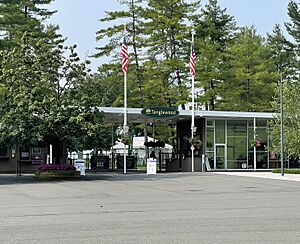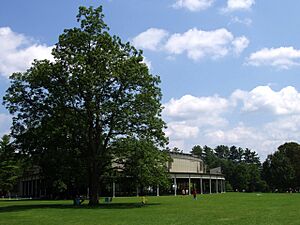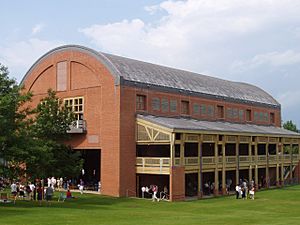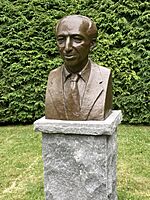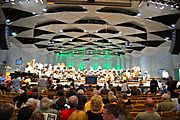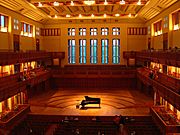Tanglewood facts for kids
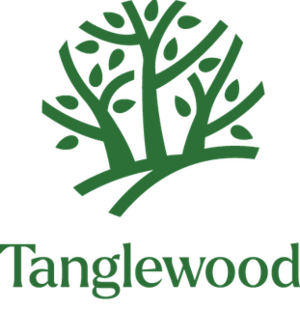 |
|
| Former names | Berkshire Music Center |
|---|---|
| Address | 297 West Street, Lenox, Massachusetts, United States |
| Location | Lenox, Massachusetts, United States |
| Coordinates | 42°20′57″N 73°18′36″W / 42.34917°N 73.31000°W |
| Owner | Boston Symphony Orchestra |
| Capacity | Koussevitzky Music Shed: 5,700 Seiji Ozawa Hall: 1,200 |
| Construction | |
| Built | 1937–1938 |
| Opened | August 4, 1938 |
| Renovated | 1959 |
| Tenants | |
| Boston Symphony Orchestra Tanglewood Music Festival Tanglewood Music Center Tanglewood Learning Center Boston University Tanglewood Institute |
|
Tanglewood is a famous place for music in Massachusetts, United States. It is both a music venue and a festival. Tanglewood is located in the beautiful Berkshire Hills. Since 1937, it has been the summer home of the amazing Boston Symphony Orchestra (BSO).
Tanglewood is also a place where young musicians can learn. It has three music schools: the Tanglewood Music Center, Tanglewood Learning Center, and the Boston University Tanglewood Institute. Besides classical music, Tanglewood hosts many other types of events. You can enjoy modern music, jazz, and popular artists. Famous musicians like James Taylor and John Williams often perform here. The Boston Pops also makes frequent appearances.
Contents
Tanglewood's History
How Tanglewood Began
The story of Tanglewood started with a few concerts in 1934. These concerts took place at the Interlaken estate. A composer and conductor named Henry Kimball Hadley wanted to create a summer music festival. He found a helpful supporter in Gertrude Robinson Smith. Together, they organized concerts with the New York Philharmonic Orchestra. The first concert was held in an outdoor theater. Even the President's mother, Sara Delano Roosevelt, attended. These first concerts were very successful.
Boston Symphony Orchestra Arrives (1936)
After two summers with the New York Philharmonic, the Boston Symphony Orchestra (BSO) was invited. The BSO, led by Conductor Serge Koussevitzky, played its first concert in the Berkshires in 1936. This concert was held at a place called Holmwood. Since then, the BSO has been the main attraction of the festival.
Moving to the Tanglewood Estate (1937)
In 1937, the festival moved to its current location. This land was called "Tanglewood." It was given by Mrs. Gorham Brooks and Miss Mary Aspinwall Tappan. The name "Tanglewood" comes from a book called Tanglewood Tales. This book was written by Nathaniel Hawthorne while he lived on the estate.
That year, concerts were held in a temporary tent. One day, a big thunderstorm interrupted a concert. Gertrude Robinson Smith stood up and asked the crowd for help. She said they needed a permanent building. In just a few minutes, people donated over $30,000!
The Music Shed Opens (1938)
Because of the donations, a permanent building was built the next year. This building is a large, fan-shaped structure. It is now known as the Koussevitzky Music Shed, or "The Shed." It has about 5,100 seats. This gave the BSO a permanent place to perform outdoors. Beyond The Shed, there are wide lawns where people can relax. From here, you can see Stockbridge Bowl and Monument Mountain.
Tanglewood's Later Years
The Boston Symphony Orchestra has played in the Koussevitzky Music Shed every summer since 1938. The only exceptions were during World War II (1942–45) and the COVID-19 pandemic in 2020. The Shed was updated in 1959 to improve its sound. In 1986, Tanglewood grew bigger by adding the Highwood estate.
Seiji Ozawa Hall was built in 1994 on this new land. In 1990, famous conductor Leonard Bernstein led his last concert at Tanglewood.
Remembering Aaron Copland
After he passed away in 1990, the ashes of composer Aaron Copland were scattered at the Tanglewood Music Center. There is a special garden with a statue of Copland on the Tanglewood grounds.
Young Musicians at Tanglewood
Tanglewood is not just for famous musicians. It also helps train young artists. In 1940, conductor Serge Koussevitzky started a summer school. About 300 young musicians attended. This school is now called the Tanglewood Music Center.
Another program nearby is the Boston University Tanglewood Institute (BUTI). This program also works with young musicians. Days in the Arts (DARTs) is for middle school students. Many youth orchestras have performed at Tanglewood. These include groups from Norwalk, Connecticut, and Albany, New York.
BSO and Tanglewood Music Directors
Here are some of the main music directors for the Boston Symphony Orchestra and Tanglewood:
- Serge Koussevitzky (1936–1949)
- Charles Munch (1949–1962)
- Erich Leinsdorf (1962–1969)
- William Steinberg (1969–1972)
- Seiji Ozawa (1973–2002)
- James Levine (2004–2011)
- Andris Nelsons (2014–present)
Tanglewood's Buildings
- The Koussevitzky Music Shed opened in 1938. It was updated in 1959 to make the sound better. Most BSO concerts, all Pops concerts, and some Tanglewood Music Center orchestra concerts happen here.
- Seiji Ozawa Hall opened in 1994. This is where most chamber music concerts take place. It is also used for Tanglewood Music Center orchestra concerts. Experts have called Seiji Ozawa Hall one of the best concert halls in the U.S. It has won many awards for its design.
- The Aaron Copland Library and other buildings are also on the Tanglewood grounds. These include a theater and practice rooms.
See also
 In Spanish: Tanglewood para niños
In Spanish: Tanglewood para niños
- List of concert halls
- List of opera festivals
 | Valerie Thomas |
 | Frederick McKinley Jones |
 | George Edward Alcorn Jr. |
 | Thomas Mensah |


